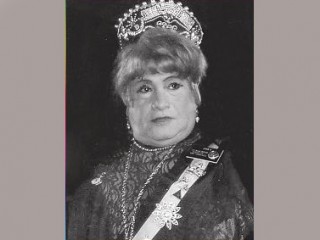
José Sarria biography
Date of birth : 1922-12-12
Date of death : -
Birthplace : San Francisco, California, U.S.
Nationality : American
Category : Famous Figures
Last modified : 2010-08-27
Credited as : Singer, drag Queen and political activist, "the Widow Norton"
0 votes so far
One of the most colorful and outspoken pre-Stonewall political activists is actually a pioneer in gay political theater. Native San Franciscan José Sarria--legendary drag entertainer, self-confessed, tongue-in-cheek "widow" of San Francisco's infamous Emperor Norton, and first out gay person to run for public office--emerged in all his finery from the maelstrom of gay purges and persecutions that were standard operating procedure throughout mid-century America. Urging closeted "nelly queens" to stand up and be counted, stand out and take their prideful place in society, Sarria sounded the rallying cry for acting-up/out brothers and sisters to follow. He did it all, and continues to do it all, in song and high heels. Even today, "on the sunny side of seventy," he remains active as a nationwide AIDS fundraiser with the Imperial Court system he helped found in the 1965.
In the late 1940s, José and his sister, Maria, hung out with the bohemian likes of Allen Ginsberg, William Saroyan and even John Steinbeck at the Black Cat in San Francisco's North Beach. In no time at all, Sarria was drawing a Sunday afternoon crowd of hundreds with campy, high-heeled arias from Carmen and Tosca. Homosexuals soon packed the bar but, according to Sarria in Randy Shilts' The Mayor of Castro Street, they were "a dispirited bunch." "He'd be damned if he was going to see far more conventional men (than himself) wallow in self-contempt while he was having a good time," says Shilts. That is when Sarria claims the "preaching began." He turned the traditional form of gay self-deprecation--drag--on its heels and pioneered political theater, blazing a trail for all gay agitprop to follow.
For those precious few hours when Sarria was center-stage, gays in the sterile, oppressive early 1950s could actually be proud of who they were. Hundreds of men were being arrested every month on vice charges, and pleading guilty to anything in an often unsuccessful attempt to maintain their anonymity. Sarria's weekly drag shows were thus both bawdy revivals and the city's first gay news wire. "A blue fungus has hit the parks," Shilts quotes Sarria as telling his fans during a heavy crackdown on sex in the local parks. "It does not appear until about 2 am (and) twinkles like a star," he would add in direct allusion to some of San Francisco's police force.
This does not seem overly political by today's standards--until you note that, at the end of each performance, Sarria would invariably rouse the usually self-deprecating crowd to tearful defiance and pride sans satire. "José would make these political comments about our rights as homosexuals," pre-Stonewall activist George Mendenhall told John D'Emilio in Making Trouble--Essays in Gay History, Politics, and the University, "and at the end .. . he would have everybody in the room stand, and we would put our arms around each other and sing 'God Save Us Nelly Queens' (sometimes stepping outside to be within earshot of police and gay men in jail right across the street). It sounds silly, but if you lived at that time ... to be able to put your arms around other gay men and sing.... We were not really saying 'God Save Us Nelly Queens.' We were saying 'We Have Rights Too.'"
Naturally enough, and in spite of the crackdowns and arrests, gays were already claiming Halloween as their high holy day--and here again Sarria took the lead. On this one evening a year, the infamous San Francisco "Lilly Law" would turn a blind eye to homosexual antics, even going so far as to have the chief of police escort the elegantly gowned Sarria to the center of North Beach, if only for a brief Cinderella star-turn that was to last only until the wee hours of November 1. It was Sarria's one-person campaign that was largely responsible for this one traditional night of "drag-rule."
By 1961, Sarria's politics took tangible form in a run for San Francisco city supervisor. He was the first openly gay person in the United States to run for public office. He knew he had no chance of winning, as he told D'Emilio, but "was trying to prove to my gay audience that I had the right, being as notorious and gay as I was, to run for public office, because people in those days didn't believe you had rights." In the end, he got glowing endorsements and collected well over 6,000 votes--particularly impressive considering that he did no campaigning, simply garnering votes via word-of-mouth. In the process, he forced a traditionally docile gay population to look at their lives in more political terms. As Shilts notes, Sarria's candidacy "stirred the imaginations of the handful of activists who then dared consider political action as a future option.. .. so few had bothered to consider that no matter what police or judges could deprive them of, they could still vote." As author Richard Dyer notes, the mere act of running "gave a politically explicit edge to the potential for defiance that he found in drag"--one that set a precedent for gay and lesbian political action to follow.
Today, Sarria travels the country as a founder of the Imperial Court system, raising hundreds of thousands of dollars yearly for a variety of AIDS causes--Operation Concern, Open Hand, and AIDS pediatric wards among them. There are over 67 Courts in as many cities raising money through fundraisers and local elections of worthy "Queens and Kings." The San Diego Court even extends its mission across the border to men and women in Tijuana in need of medical supplies and the like.
















